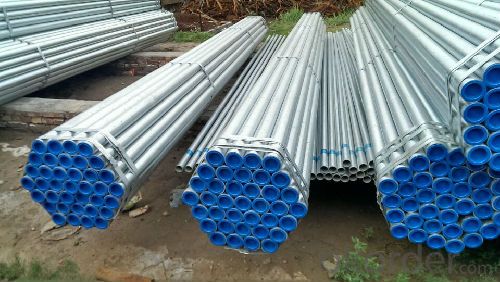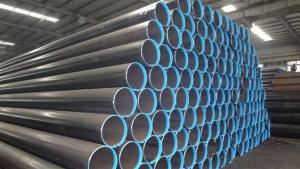LSAW Steel Pipe with High Quality from CNBM
- Loading Port:
- China Main Port
- Payment Terms:
- TT or LC
- Min Order Qty:
- -
- Supply Capability:
- -
OKorder Service Pledge
OKorder Financial Service
You Might Also Like
1、Structure of High Quality LSAW Steel Pipe:
Seamless pipe is formed by drawing a solid billet over a piercing rod to create the hollow shell. As the manufacturing process does not include any welding, seamless pipes are perceived to be stronger and more reliable. Historically seamless pipe was regarded as withstanding pressure better than other types, and was often more easily available than welded pipe.
2、Main Features of High Quality LSAW Steel Pipe:
• High manufacturing accuracy
• High strength
• Small inertia resistance
• Strong heat dissipation ability
• Good visual effect
• Reasonable price
3、High Quality LSAW Steel Pipe Specification:
Standard | GB, DIN, ASTM ASTM A106-2006, ASTM A53-2007 |
Grade | 10#-45#, 16Mn 10#, 20#, 45#, 16Mn |
Thickness | 8 - 33 mm |
Section Shape | Round |
Outer Diameter | 133 - 219 mm |
Place of Origin | Shandong, China (Mainland) |
Secondary Or Not | Non-secondary |
Application | Hydraulic Pipe |
Technique | Cold Drawn |
Certification | API |
Surface Treatment | factory state or painted black |
Special Pipe | API Pipe |
Alloy Or Not | Non-alloy |
Length | 5-12M |
Outer Diameter | 21.3-610mm |
Grade | 20#, 45#, Q345, API J55, API K55, API L80, API N80, API P110, A53B |
Standard | ASME, ASTM |
1) Material:20#(ASTM A 106/A53 GRB.API5LGRB,GB),45#,16Mn,10#.
2) Specification range:OD:21.3-610mm,WT:6-70mm,length:6-12m or according to the requirement of clients.
3) Excutive standards:GB,ASME API5L.ASTM A 106/A53,Despite of the above standards,we can also supply seamless steel pipe with standard of DIN,JIS,and so on,and also develop new products according to the requirements of our clients!
4) Surface:black lacquered,varnish coating or galvanized.
5) Ends:Beveled or square cut,plastic capped,painted.
6) Packing:bundles wrapped with strong steel strip,seaworthy packing.
4、Packaging & Delivery
Packaging Details: | seaworthy package,bundles wrapped with strong steel strip |
Delivery Detail: | 15-30days after received 30%TT |
5、FAQ of High Quality LSAW Steel Pipe:
①How is the quality of your products?
Our products are manufactured strictly according to national and internaional standard, and we take a test
on every pipe before delivered out. If you want see our quality certifications and all kinds of testing report, please just ask us for it.
Guaranteed: If products’ quality don’t accord to discription as we give or the promise before you place order, we promise 100% refund.
②How about price?
Yes, we are factory and be able to give you lowest price below market one, and we have a policy that “ for saving time and absolutely honest business attitude, we quote as lowest as possible for any customer, and discount can be given according to quantity”,if you like bargain and factory price is not low enough as you think, just don’t waste your time.Please trust the quotation we would give you, it is professional one.
③Why should you chose us?
Chose happens because of quality, then price, We can give you both.Additionally, we can also offer professional products inquiry, products knowledge train(for agents), smooth goods delivery, exellent customer solution proposals.Our service formula: good quality+good price+good service=customer’s trust
SGS test is available, customer inspection before shipping is welcome, third party inspection is no problem.
6.Images

- Q:What is the fatigue strength of steel pipes?
- The fatigue strength of steel pipes refers to the maximum stress level that the pipes can endure without experiencing fatigue failure or damage over a given number of stress cycles. It varies depending on factors such as the steel composition, manufacturing process, pipe dimensions, and environmental conditions.
- Q:What are the different coatings used on steel pipes?
- There are several different coatings used on steel pipes, including epoxy coatings, polyethylene coatings, zinc coatings, and fusion bonded epoxy coatings. These coatings are applied to protect the steel pipes from corrosion and extend their lifespan.
- Q:Can steel pipes be used for stormwater management systems?
- Yes, steel pipes can be used for stormwater management systems. Steel pipes are commonly used in stormwater management systems for their durability, strength, and resistance to corrosion. They can efficiently transport stormwater runoff, helping to manage and control its flow. Additionally, steel pipes can be customized to meet specific project requirements, making them a versatile choice for stormwater management systems.
- Q:Can steel pipes be used for chemical refineries?
- Chemical refineries can utilize steel pipes for their operations. Steel pipes are frequently employed in chemical refineries because of their exceptional strength, long-lasting nature, and resistance to corrosion. Given the harsh conditions present in a chemical refinery, including exposure to corrosive chemicals and extreme temperatures, it is necessary to employ materials that can endure such circumstances. Steel pipes possess the capability to withstand these challenges and are often preferred for their ability to securely and efficiently transport diverse fluids and gases. Furthermore, the weldability of steel pipes permits easy installation and maintenance within intricate refinery systems. All in all, steel pipes are a fitting choice for chemical refineries due to their durability, ability to resist corrosion, and compatibility with the demanding conditions encountered in this industry.
- Q:What are the different methods of heat treatment for steel pipes?
- Some of the different methods of heat treatment for steel pipes include annealing, quenching, tempering, normalizing, and stress relieving.
- Q:How are steel pipes inspected for defects?
- Steel pipes are inspected for defects using various methods, including visual inspection, ultrasonic testing, magnetic particle inspection, dye penetrant testing, and radiographic examination. These techniques help identify any cracks, corrosion, or other defects in the pipes to ensure their structural integrity and prevent any potential hazards or failures.
- Q:How are steel pipes used in the manufacturing of agricultural machinery?
- Steel pipes are commonly used in the manufacturing of agricultural machinery for various purposes such as structural support, fluid transportation, and hydraulic systems. They provide durability and strength to the machinery, allowing it to withstand the heavy loads and harsh conditions associated with agricultural activities. Additionally, steel pipes are often used to create the framework and chassis of the machinery, ensuring its stability and longevity in the field.
- Q:Can steel pipes be recycled and used for other purposes?
- Yes, steel pipes can be recycled and used for other purposes. Steel is a highly recyclable material, and steel pipes are no exception. Recycling steel pipes helps to conserve natural resources and reduce the demand for new steel production. When steel pipes are recycled, they are typically sent to a recycling facility where they are sorted, cleaned, and processed. The pipes are then crushed into smaller pieces or melted down to be reshaped into new steel products. Recycled steel pipes can be used for a variety of purposes. They can be used in construction projects, such as for building bridges, roads, or buildings. They can also be used in the manufacturing of new steel products, such as automotive parts, appliances, or furniture. Additionally, recycled steel pipes can be used in the energy sector, for example, in the production of wind turbines or oil and gas pipelines. Using recycled steel pipes not only helps to reduce waste and conserve resources but also has environmental benefits. The recycling process requires less energy and produces fewer greenhouse gas emissions compared to the production of new steel. Therefore, recycling steel pipes is a sustainable option that contributes to a circular economy and helps to protect the environment.
- Q:What are the different types of steel pipe valves?
- Various industries and applications commonly utilize several types of steel pipe valves. Here, we present some of the most frequently used types: 1. Gate valves: These valves control fluid flow by raising or lowering a gate or wedge that obstructs the flow path. They ensure a tight seal when closed and are prevalent in applications requiring complete shut-off or full flow. 2. Globe valves: With a globe-shaped body and a movable plug or disc, these valves regulate fluid flow. They excel in throttling capabilities and find application in situations demanding precise flow control. 3. Ball valves: Fluid flow is managed by a rotating ball with a hole in these valves. Alignment of the hole with the pipe signifies full openness, while a perpendicular hole indicates closure. Ball valves are durable, reliable, and extensively used in swift and effortless shut-off applications. 4. Check valves: These valves allow fluid flow in only one direction, preventing backflow. They are instrumental in safeguarding pumps, compressors, and other equipment from reverse flow-induced damage. 5. Butterfly valves: Butterfly valves feature a rotating disc within the pipe to control fluid flow. They are lightweight, compact, and provide rapid shut-off. Butterfly valves are commonly employed in large-scale applications like water treatment and HVAC systems. 6. Plug valves: By utilizing a cylindrical or conical plug, plug valves regulate flow within the valve body. Their simple design, ease of operation, and dependable shut-off capabilities make them prevalent in applications requiring frequent operation and high pressure ratings. 7. Diaphragm valves: These valves employ a flexible diaphragm to manage fluid flow. Pressing the diaphragm against the valve seat blocks flow, while lifting it allows flow. Diaphragm valves are frequently used in environments requiring sterility or hygiene. These examples illustrate the variety of steel pipe valves available in the market. The choice of valve depends on specific requirements, including flow rate, pressure, temperature, and the nature of the transported fluid.
- Q:Are steel pipes suitable for underground industrial waste disposal?
- Steel pipes are often used for underground industrial waste disposal due to their durability and strength. They have the ability to withstand the harsh conditions underground, including moisture, pressure, and corrosion. Additionally, steel pipes are resistant to chemical reactions, making them suitable for handling various types of industrial waste. They can effectively transport and contain hazardous materials, ensuring the safety and protection of the environment and surrounding areas. Overall, steel pipes are considered a reliable and efficient option for underground industrial waste disposal.
1. Manufacturer Overview |
|
|---|---|
| Location | |
| Year Established | |
| Annual Output Value | |
| Main Markets | |
| Company Certifications | |
2. Manufacturer Certificates |
|
|---|---|
| a) Certification Name | |
| Range | |
| Reference | |
| Validity Period | |
3. Manufacturer Capability |
|
|---|---|
| a)Trade Capacity | |
| Nearest Port | |
| Export Percentage | |
| No.of Employees in Trade Department | |
| Language Spoken: | |
| b)Factory Information | |
| Factory Size: | |
| No. of Production Lines | |
| Contract Manufacturing | |
| Product Price Range | |
Send your message to us
LSAW Steel Pipe with High Quality from CNBM
- Loading Port:
- China Main Port
- Payment Terms:
- TT or LC
- Min Order Qty:
- -
- Supply Capability:
- -
OKorder Service Pledge
OKorder Financial Service
Similar products
New products
Hot products
Related keywords






























